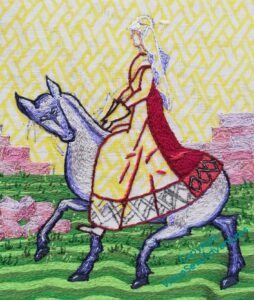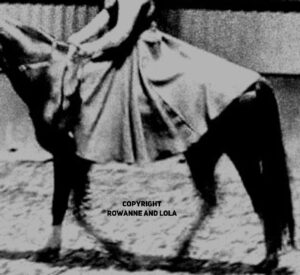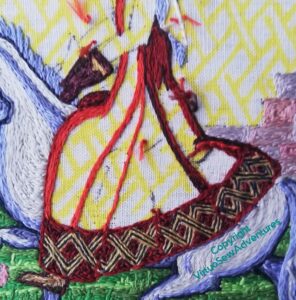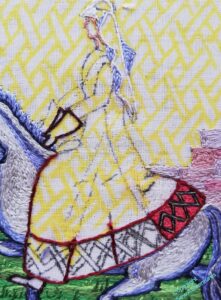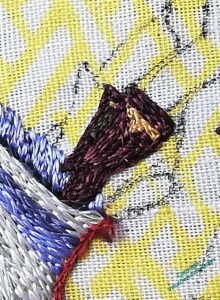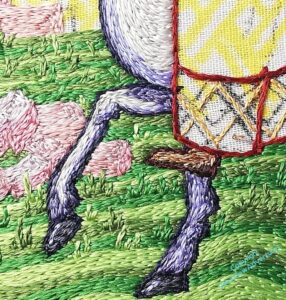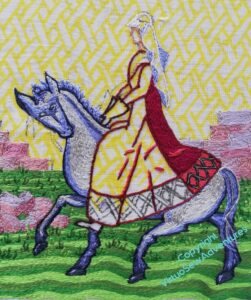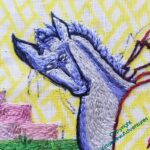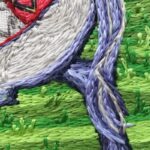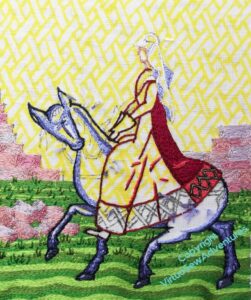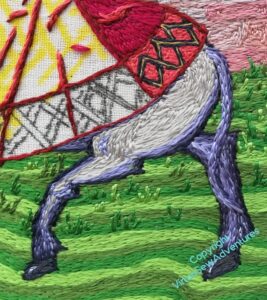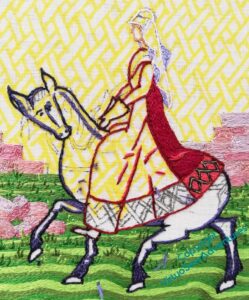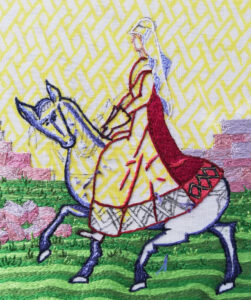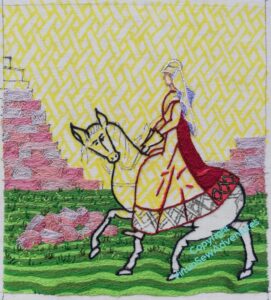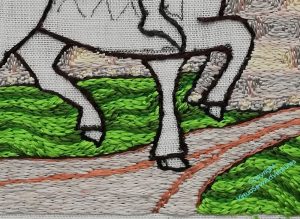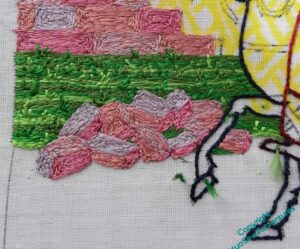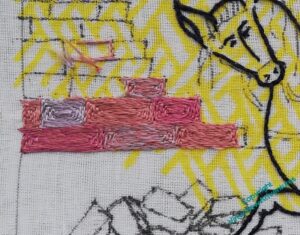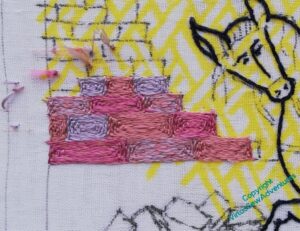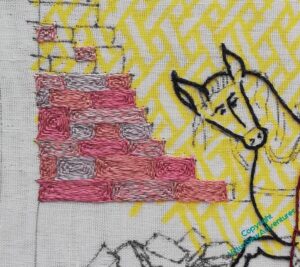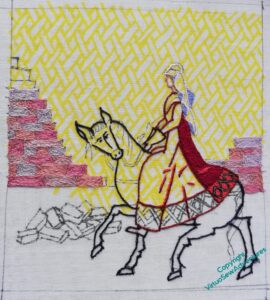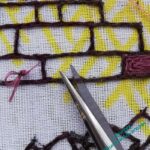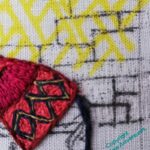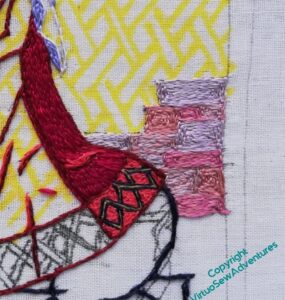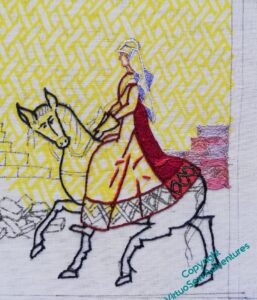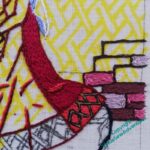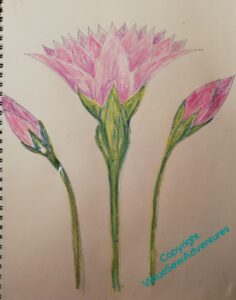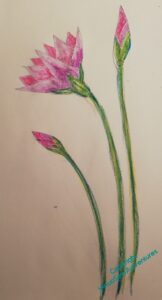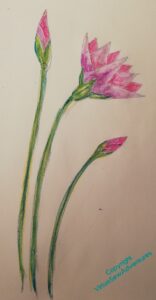Tag: Designing
Aethelflaed’s Dress – going round again!
Just so we know where we stand…
Before I went through the reboot, I’d the back panel stitched and some dark lines in place – shadows and stitch lines. It’s not right at all. It looks unthought-through, and the drapery isn’t draping in a way that makes sense even in a medieval fashion.
So in the end I took it all out, ornate border and all, and started again.
I’ve broadened the decorative border to have two navy lines and three gold, and given it a darker background.
Then I turned one of my resource photos into greyscale, printed it out and stared at it. I’ve also stretched out the colours a bit to emphasize the lights and the darks.
So now, I want to translate what I’ve seen to the slightly different cut of Aethelflaed’s dress, and the slightly different style of Opus. That may be a bit tricky.
First thing to do was to remove all the unhelpful darks already in place. I think I just need to start all over again!
So here is the start of starting all over again. Light at the front, quite broad, and some new highlights. I may have to think a bit more about the border, but I believe that will be easier to do as the rest of the dress comes together.
I also need to get the sleeves in. There’ll be a contrast here, the sleeves of a contrasting shift or under-dress, and that will help the image to make sense from a difference.
Beginning on Aethelflaed herself. Again.
Sigh. When last you saw Aethelflaed, I was about to start unpicking the back of her riding dress.
It’s done now. As regular readers of my blog know, I don’t unpick unless I really can’t avoid it and I’m sure I can do better. If I have no idea what to do differently, I leave well alone until I can come up with a Plan.
Well, I have a plan now. I’m changing up which silks I use, going for something redder and with less blue in it. Here’s hoping that the border still works, but that would be a serious trial to unpick (as though a panel of straight split stitch weren’t already a trial!).
You can tell I’m not entirely sure of myself, however.. I have worked her gauntlets first!
You may recall I designed them as mittens, rather than gloves with fingers, because I could not imagine that fur lined mittens weren’t a thing for a noblewoman riding, and besides, it let me escape doing her hands. I will have to do hands for Rahere and Julian, but until then, I’m ducking it.
I gave the gauntlets a narrow border of yellow, thinking of a silk or metal braid that might have been used as a trim.
Then I decided to make sure she was shod. Practical brown ankleboots, with extra reinforcing down around the heel. I’m not sure whether stirrups were in use at this point, and in any case, I think it’s a detail I don’t need to add at this stage.
And now I really can’t put off that dress any longer!
Mane, Tail, and Headache!
I still need to find a name for this horse.
However, there’s time for that. Keep stitching.
The mane and tail didn’t take too long, and the horse is looking bright and neat. I think the image as a whole is working so far (thank goodness, it’s an awfully time-consuming technique to end up dissatisfied with!), so I’m happy to keep going.
I might be able to get back to the tussocks soon, but in the meantime, close ups.
I chose to do a short standing mane for this horse, rather than the flowing locks for William’s horse, but gave it a little quiff of a forelock as well.
I was trying to create the effect of flying strands crossing over in the tail, but instead I’ve got a kink in it. I might have to do something different there, but until I’ve worked out what, I shall leave well alone!
I have another problem.
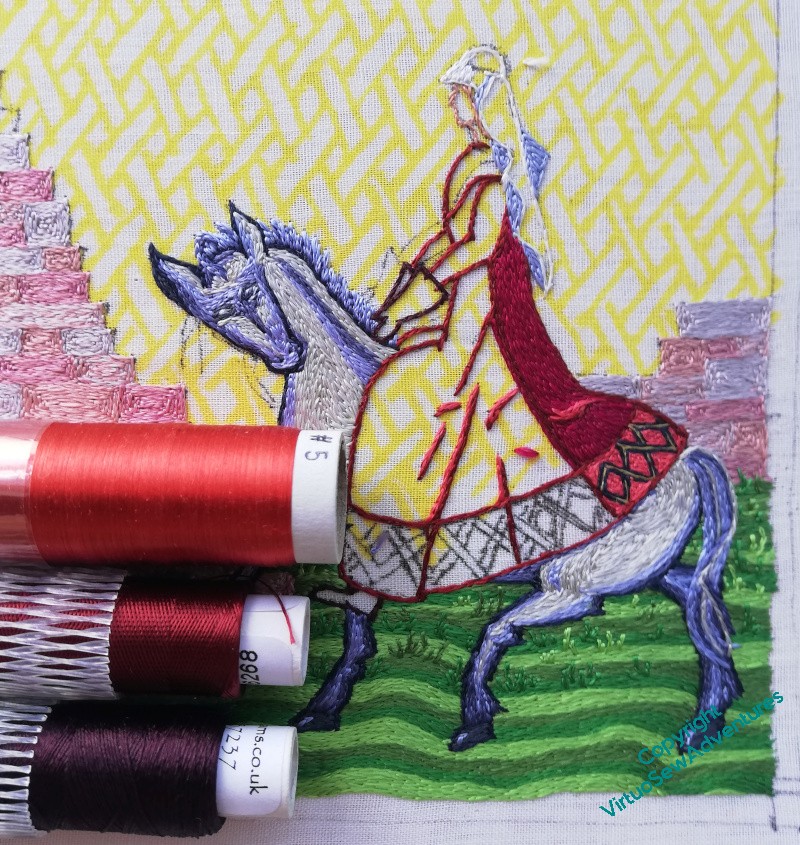
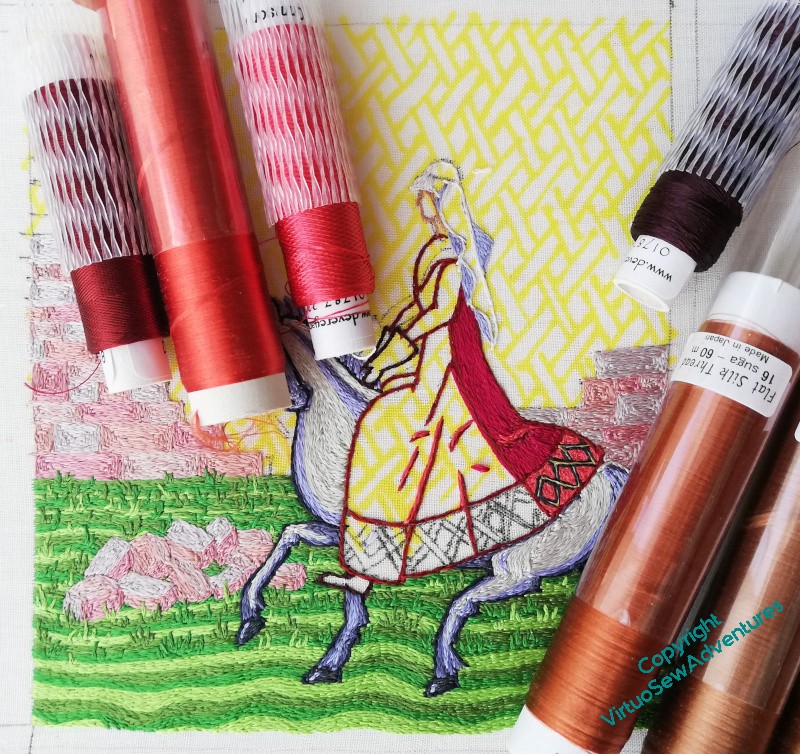
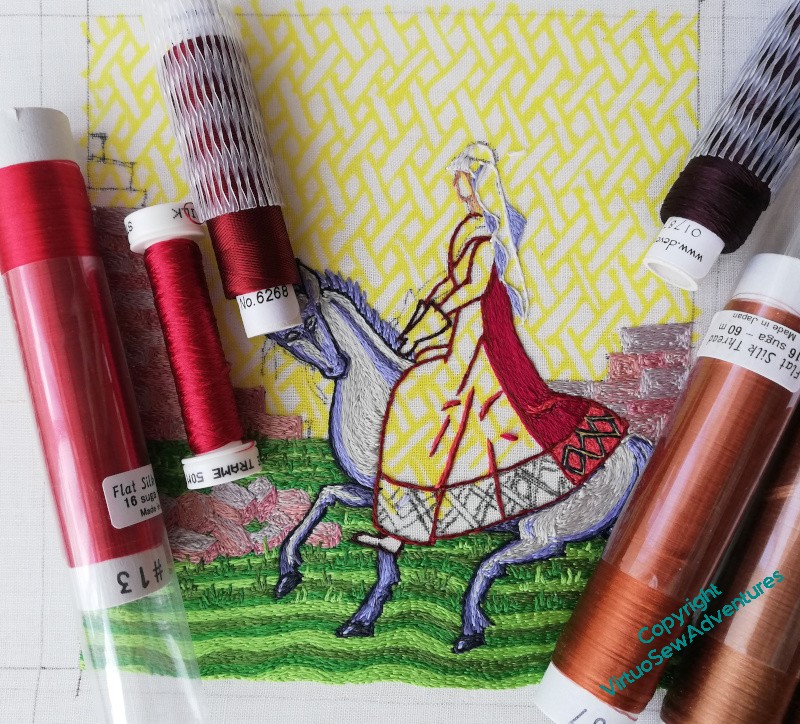
I’m not happy with the colours on her dress, there’s something a bit “off”, not the atmosphere I’m looking for. So yes, I’m going to have to undo the dress.
<fx: growls>
More on Aethelflaed’s Horse
Onward and forward, as my Grandad used to say!
I want to make Aethelflaed’s horse contrast with William’s in more than just colour, so instead of doing dapples, I’m just going to have the horse smooth of coat and light of colour.
I got a little adrift earlier with the horse’s eyes, and I’m a bit unsure about whether I have enough of the lighter blue, but I think it’s going to work reasonably well. I can probably add more if I need to when the whole thing is finished and I am trying to balance the whole thing.
Here we are, then, with the horse filled in and the eyes more Opus-style. I get rather the feeling that this horse may be the “getting there under my own steam” steed, but it’s a bit of a ham, high-stepping, head up, adding to its rider’s mystique.
That, of course, is no bad thing. A ruler of the early medieval period needed to have some grip on self promotion, as well adjudicating when their people turned to them, choosing when to make peace and how to make war. Aethelflaed must have understood how to craft her presentation, for the benefit of Mercia as much as herself.
The Irish Chronicles mentions of Aethelflaed are full of superlatives, so my depiction needs to offer some impression of that glowing prestige, reaching across the Irish Sea.
Even if her brother Edward the Elder’s chroniclers don’t mention her at all. Jealous, much?
Anyway, body in place, on to mane and tail!
Aethelflaed’s Horse
Now the thing about Opus Anglicanum is that it’s lots of very small stitches, so you maybe don’t see so much of Aethelflaed, but apart from occasional periods of Life getting in the way, she is making progress.
I’ve started on her horse. It’s going to be a grey – what you see of it, what with her riding dress and all! – so with a wave of my artistic licence, shadows and details are going blue.
I have time to wonder what she’d call her horse – all the names I can come up with tend towards the Norman French (Blanchemain, Blanchefleur), and that’s a good couple of centuries too early. So I’m looking for something Brythonnic, or Welsh (although the Mercians weren’t on reliably good terms with the Welsh, so maybe not..). Welsh would suggest something with “gwyn” in (for “white). Moving to Old English, “hwita” is “white”, but “aedre” is “stream”, and then suddenly you have a name starting with the same syllable as the rider’s. And that is the sort of thing you find in retellings of myths as a way to bring the two close together in the mind.
Thoughts, anyone?
I’ve not forgotten Aethelflaed…
… although I will admit that sometimes I don’t manage to fight away all the things that get between me and my frame at a time of day when I have any chance of stitching her sensibly!
However – I’ve done the grass!
Well, I stopped doing tussocks when I thought I might want to do more extensive tussocks in the foreground, and decided to do the horse first, in case I wanted seedheads nodding over its legs. But apart from the tussocks, the grass is done.
However, that means I now have a decision to make…
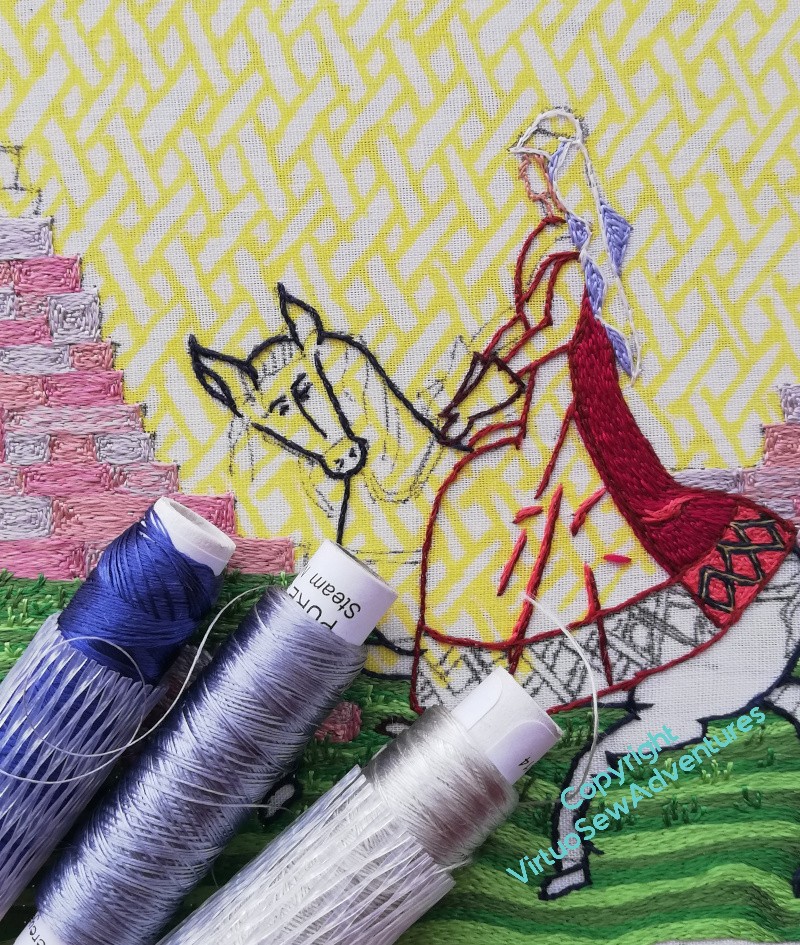
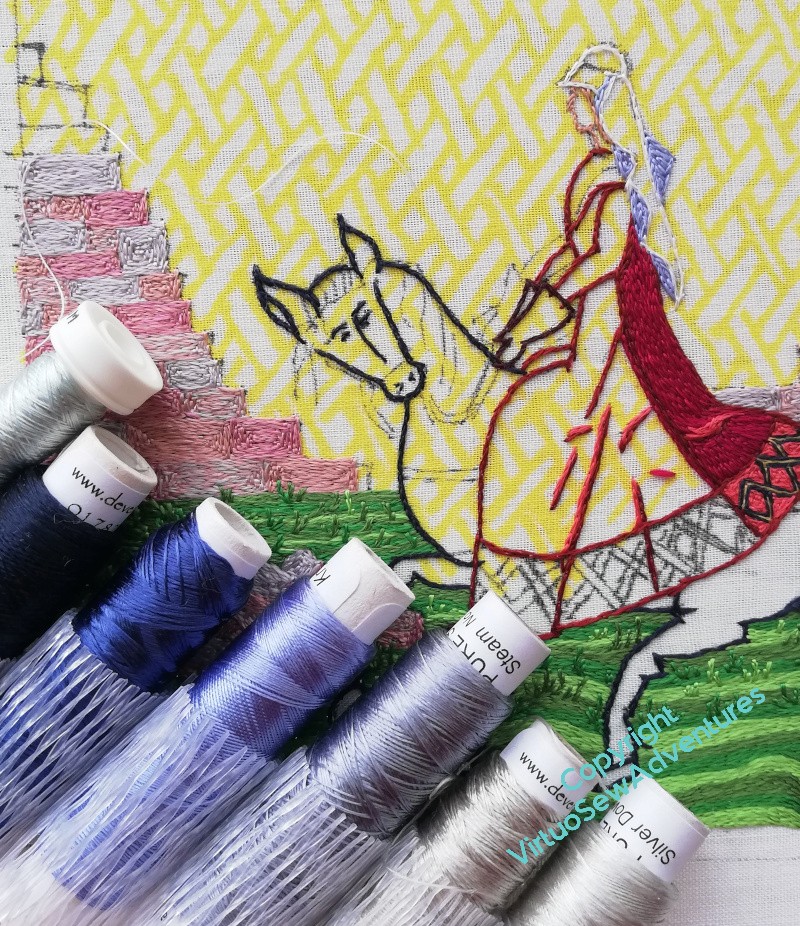
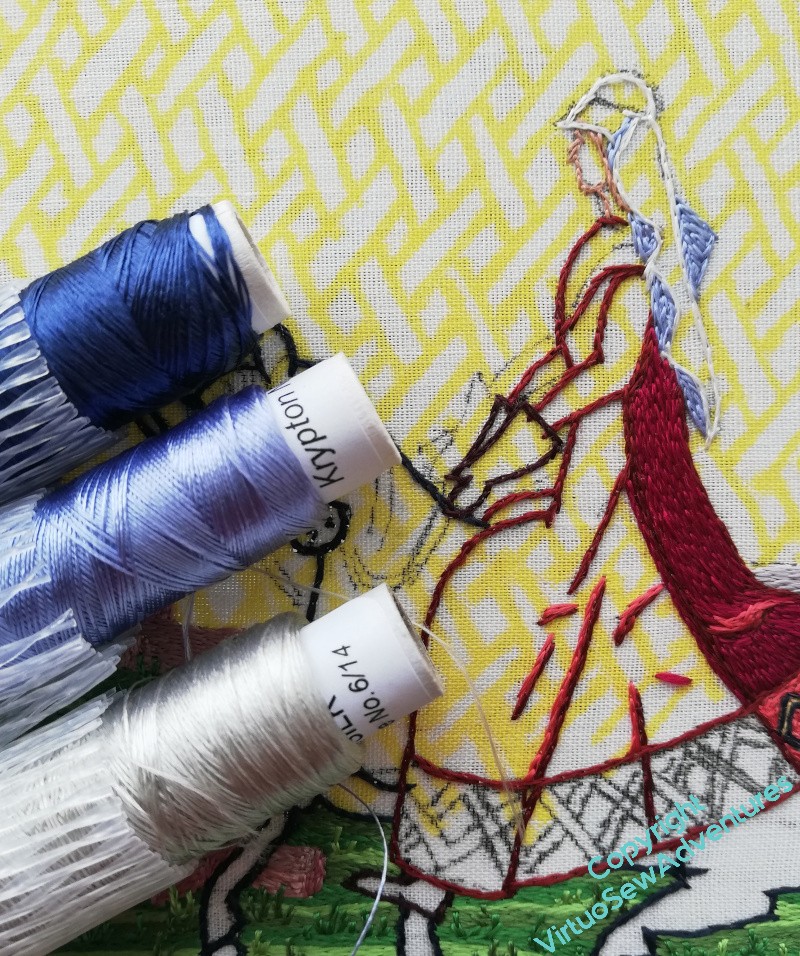
I’ve decided she’ll be mounted on a grey (contrasting with William The Marshall’s chestnut), and that it will be grey tending to blue. But which blue, and how much blue, and what colour should the lightest shade be? This is going to be important, as I think I’m not going to do dapples this time, just shading and a smooth coat.
Some thinking required…
Tackling Stones And Tussocks
You may recall that when I was stitching William Marshall, I chose to use more strands of silk in the needle, and to stitch relatively calm curves and unevennesses in the ground. I wanted to suggest that William’s kinsman kept the land around the walls of his stronghold close clipped (by grazing, one presumes) so as to ensure that he could not be take too much by surprise, whether by welcome or unwelcome visitors.
Aethelflaed, of course, is visiting, in effect, a building site. She has no road, and her horse is picking its way around heaps of building stone and over grass that’s tussocky and and uneven. I gave some thought to the question of how to represent that, staying true to the aesthetic, using only silk and split stitch, but creating some of my own variations. After all, this is modern, inspired by the past, not a reconstruction of an existing piece. I have a little freedom of movement here!
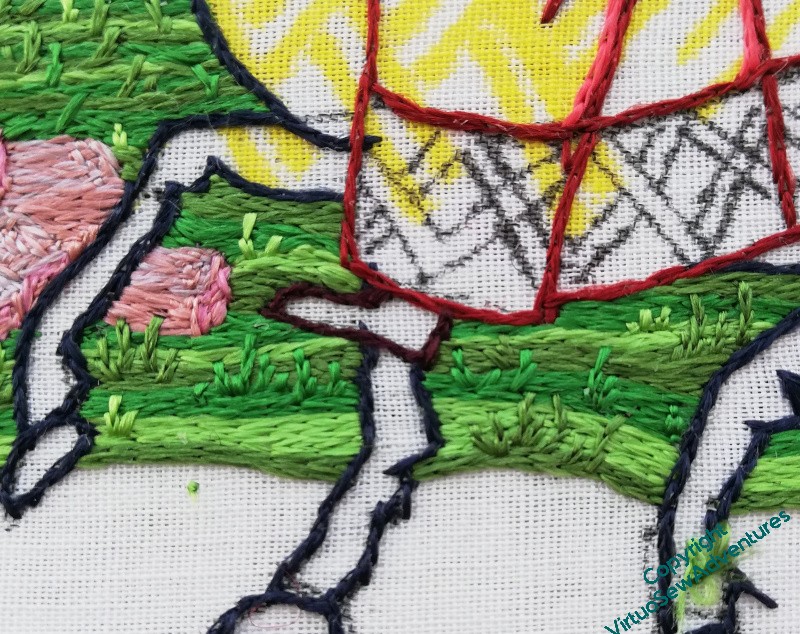
So I’m using three different greens, and I’ve not increased the thickness of the silk in my needle. I’m not stitching the curves quite as regularly, and I’ve devised a way to stitch little tussocks at uneven intervals across the ground. They are just little groups of split stitch lines crossing the flows of colour, but I think they are working rather well so far.
It has only just occurred to me, however, that I may have a slight tweak to make in my process for doing them, as I come forward: they need to get bigger, cross more of the lines of colour. Do I now just put the colour in, so that small tussocks don’t compete visually with large tussocks, or do I just carry on regardless?
Now, a reminder that I shall be giving a talk for the Embroiderers Guild on June 3!
I believe I’ve turned this image into a link to the Eventbrite page, and for anyone not in the right timezone, or otherwise occupied on the day of the talk, the Guild makes recordings available for some time afterwards.
I shall remind you every week until it happens!
Questions About A Wall
So, having once decided to redo the walls, I had to actually do it!
I’m rediscovering the quiet process I found with William Marshall, sitting down at my frame of a morning, working until the sun comes around and casts shadows across the work, or until I find myself losing focus, whichever comes the sooner. You may recall that I was surprised to find myself so enamoured of a technique that involves only a single stitch!
This time, however, that single stitch is very much part of the conception of the project, and I have learned that I can delight in the subtleties of something that once would have bored or frustrated me. I am pleased to find I’m still enjoying it, and in spite of the unusual level of pre-designing I’ve done (and I’ve yet to really get started on Rahere and Lady Julian!), there are still details and ideas to work out.
I’m keeping to the close tones I chose, using two of the three possible blends, and two solid colours. I think that is working well to represent the assorted colours in Cheshire sandstone, while being pale and pulled back, not dominating Aethelflaed but allowing her to dominate instead.
I have been quietly, methodically, choosing a silk, stitching my square spirals, stitch by stitch and block by block, thinking only to raise the remnants of the Roman Walls so that Aethelflaed can restore them.
And then, last week, I was blamelessly stitching my blocks, when I looked at my design with a new eye, and suddenly I have a thought to think through.
Notionally, for me, Aethelflaed in this design is outside the walls, touring the building site, as it were. That’s one of the reasons that I made the wall more than head-high on the rider. However, last week it suddenly seemed to me that visually, that high wall was blocking Aethelflaed’s view, and I’m not sure I want that.
Fortunately, I have all the rest of the silk embroidery, including the borders (still not entirely designed!) before I need to be certain of my decision.
Not quite starting over…
Well, what with putting her away over Christmas and then taking some time to make a decision about what to do next, it’s been a while since you saw Aethelflaed..
And here I am, snipping and snipping away at all of the wall outlines, the blocks I’d already stitched, and even the pile of blocks ready to be reused.
All gone!
And now, the section behind her and her horse is reinstated, using a mixture of blends and a couple of single colours. The tones are much closer together than they were originally, and I’ve also chosen not to use the dark outlines and dark “mortar”. This will help to create a more subtle background, while still having the pinky-orange of Cheshire sandstone. I’ve seen all these colours in various bits of Chester’s Walls – I’ve just chosen, this time, not to include the much darker browns and plum colours which are also there.
So much of representational art, whether it be painting or embroidery, comes down to a question of editing. What do I want to emphasize? What do I want to play down? How can I balance the colours, the shapes, the patterns, to tell the story I want to tell?
Looking at the newly worked section from further away, I think I’m happy now that the wall will pull back as I need it to.
Now I just need to keep going!
More Thoughts on a Coat..
I want my design for the Lotus Coat to be big and bold, maybe a bit blousy, so what I have here may be a bit formal, and need rethinking.
Well, happy to do that, I had a lovely morning in the studio playing with these ideas, and I think what I have now is a good point for further play.
The idea of this set of designs is that the single lotus in the image to the right here will reach almost the whole way across the top of the back, from one seam setting in the sleeve to the other, while the supporting buds will be set in fact a little lower than they are shown.
Meanwhile, on the front there will be something very similar on the left and right front.
I don’t want to make these identical – that would be too formal. So I want to create something that looks balanced, that doesn’t make me look as though I have one shoulder higher than the other.
I’m also planning how to actually achieve all this. At the moment, I’m thinking that I will try to find a light, loosely woven silk fabric that I can dye to match the tweed and stitch on that. Then I can do the stitching and be making the Coat at the same time. I’m not much of a dressmaker, so it might take a while. So I’ve ordered some samples from Whaley’s of Bradford, to try stitching on.
And for the stitchery? At the moment, I think, lots of line stitches in varying shades of white, lilac, and pink, using relatively heavy threads (at least in comparison with Aethelflaed’s filament silk!). Opportunities to use my favourite chain and feather stitch variations, to layer up stitch and effect – I might even find some angora or similar for some slightly fluffy areas. Not so densely stitched, perhaps, that you can’t see the silk, and through it, the tweed.
Of course, by the time I get to doing the stitching, I may have an entirely different idea…

